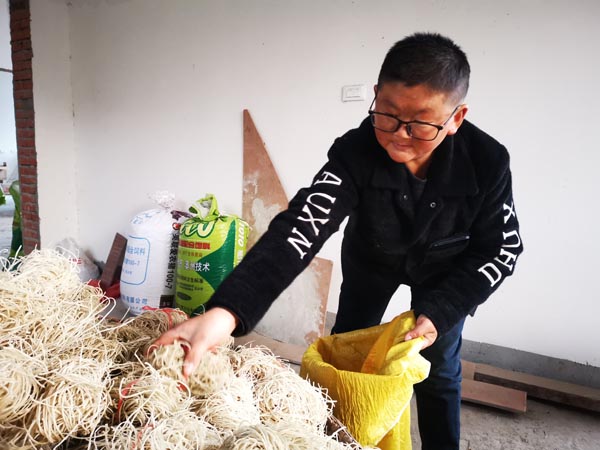 |
Zhang Chuanfeng, a farmer that Uzbek teacher Shahboz Babaev met in Anhui province, collects vermicelli made of sweet potato from fellow villagers to sell via livestreaming. [Photo/Xinhua] |
Shahboz Babaev was not surprised when he read the news that China had removed all 832 remaining impoverished counties from the poverty list.
The last nine counties, all in Southwest China's Guizhou province, had eliminated absolute poverty, the provincial government announced last week.
"The Chinese concept of promoting unity in eradicating poverty is a great example and worth being followed by other countries," says Babaev, an Uzbek lecturer in economics at the Anhui Finance and Trade Vocational College in Hefei, capital of East China's Anhui province.
The 28-year-old's thoughts are not groundless. Babaev had paid a visit to the Dabie Mountains, one of the poorest areas in Central China, where he met local people and witnessed the changes in their lives.
He has written an article based on the information collected during his trip in October and plans to share it on social media.
Deep in the mountains, he met Ge Dali, 54, one of the formerly poor villagers living in Tiansi village in the city of Qianshan.
The adobe cattle shed used to be the house where Ge's family had lived for nearly 40 years.
"It's dark and wet, with few windows and a leaking roof. I have never seen such a shabby house before," Babaev says.
Suffering from slipped disks, Ge was unable to farm for years. His family was registered as an impoverished household in 2014.
"My name Dali means 'big strength' in Chinese, but I was powerless to shake off poverty due to my back problem," Ge told Babaev.
Following the government policy to cover most medical bills for poor households, Ge received surgery on his back.
Then, with the government funds and bank loans, he started raising cattle and goats and planting rice and tea, bringing home 50,000 yuan ($7,650) in 2019.
Next to his old shack, Ge built a new two-story house equipped with electric appliances.
By the end of 2019, more than 87,100 impoverished residents in Qianshan, including Ge, were lifted out of poverty, bringing the incidence of poverty to 0.31 percent from 16.93 percent in 2014.
During his trip, Babaev found a country road built to connect different scenic spots in the mountains, which allows local people to make a living by engaging in the tourism business.
"Massive investment in infrastructure, such as roads and electricity, has connected remote and impoverished regions to the rest of the country, giving people better access to services, markets and other opportunities to build better lives," Babaev says in his article.
He also met Zhang Chuanfeng, a man with a disability, who livestreamed and sold the specialties of his hometown, such as honey and sweet potatoes, online.
China is set to eliminate absolute poverty by the end of this year, and meet the poverty eradication goal set out in the UN 2030 agenda for sustainable development 10 years ahead of schedule.
Since China's reform and opening-up began, about 800 million Chinese people have cast off poverty, representing over 70 percent of global poverty reduction. For seven consecutive years, China has lifted more than 10 million people out of poverty every year.
The Chinese government has dispatched Party officials to impoverished villages to support local governments in carrying out a set of specific measures to reduce poverty. This mobilization of resources, according to Babaev, is a necessary and effective way to meet the target.
Babaev expects to become a public servant in Uzbekistan someday in the future.
"I've learned so much about China's fight against poverty from this trip, and I hope to take these lessons back to my country," he says.